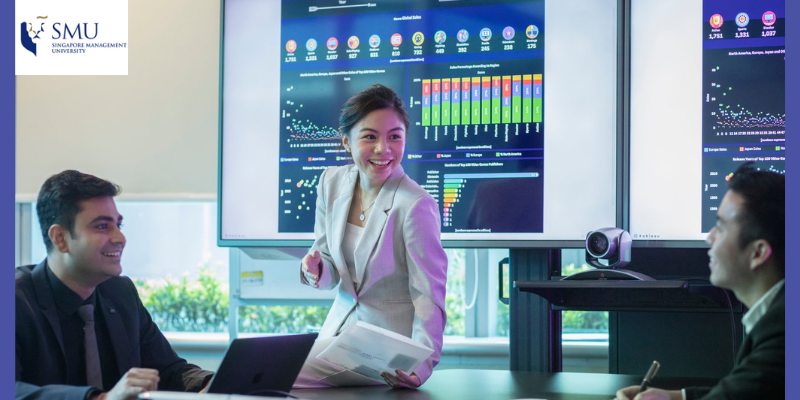
India has emerged as a global frontrunner in generative AI adoption, according to Adobe’s latest Digital Trends 2025 report, released in collaboration with Econsultancy. The country leads the world with 23% of its organisations already demonstrating measurable return on investment from working generative AI solutions, nearly double the global average of 12%.
As Indian enterprises are increasingly leveraging AI to automate customer journeys, boost engagement and improve retention, the demand for leaders who drive the digital transformation wave has never been higher. Singapore Management University’s (SMU) Master of IT in Business (MITB) program equips professionals with essential skills to leverage AI for strategic innovation.
Through two distinct yet complementary specialisation tracks—Artificial Intelligence (AI) and Digital Transformation (DT)—SMU is shaping future-ready leaders: intelligent innovators who harness AI for amplification, and agile changemakers who drive digital execution.
Driving impact at the intersection of technology and business
The AI and DT specializations within SMU’s MITB program are tailored for professionals who want to do more than understand technology—they want to shape the future with it. Each track brings a focused skillset and mindset to the table.
Digital Transformation is not just a buzzword but also a radical rethinking of how organizations deliver value. SMU’s DT track empowers students to lead this change from within.
“The curriculum spans strategy, execution, contextual understanding, and most importantly, mindsets – covering key areas such as digital transformation strategy, organizational change management, agile and product management, process innovation, experimental thinking and digital sustainability,” says Kelvin Lee, Senior Digital Transformation Instructor and Practicum Manager.
What sets SMU’s approach apart is the executional focus of this track. “With guidance from faculty who include practitioners at Government Technology Agency, Google, and other industry leaders, students not only learn how to craft transformation strategies but also navigate the people, process, and technology challenges that often stall change in legacy systems,” he says.
Launched in 2018, SMU’s AI specialization was the first of its kind in Singapore and Southeast Asia. It goes beyond traditional data science education by teaching students how to apply AI methodologies directly within business contexts.
“From foundational skills like Python programming and applied machine learning to advanced capabilities in generative AI, computer vision, recommender systems, and reinforcement learning, the track equips students with the skills required to go beyond theory and translate data into impact,” says Dr James Koh, Principal Data Science Instructor and AI Practicum Manager.
The AI program rapidly incorporates latest advancements like DeepSeek-R1 into lab work to equip students with relevant experience, he adds.
Industry-rooted and future-focused pedagogy
Despite their differences, both tracks share SMU’s signature pedagogical approach: seminar-style, discussion-based learning in small groups, fostering deep student-professor engagement. Classes go beyond imparting knowledge, they cultivate in students the ability to think strategically, critically and ethically.
Each curriculum is constantly refreshed through feedback from alumni, employers, and industry experts, with recent additions including courses on low-code development, sustainable IT, and LLMs in enterprise settings. Practical experience is core to the journey, with internships, capstone projects, SMU-X courses, site visits, and guest lectures providing continuous exposure to the real world.
Where innovation meets impact
SMU graduates are already making a mark. A DT student recently collaborated with the Migrant Workers’ Center on a project combining design thinking, LLMs, and chatbot deployment to promote financial literacy and digital inclusion. AI graduates, including those from non-technical backgrounds, have transitioned into data scientist roles at major firms—proving that with the right support, mindset trumps background.
At SMU, coding isn’t taught in isolation; it’s positioned as a critical tool to solve business problems. “Coding and critical thinking in business complement each other,” says Dr Koh. “To solve business challenges effectively, students must be able to think critically and code confidently. That’s why we teach both: guiding students to develop a sound problem-solving approach while building the technical skills needed to implement solutions.”
When it comes to managing digital disruption, Lee explains that students are equipped with practical frameworks and toolkits to craft effective digital strategies. They learn to assess competitive dynamics, internal capabilities, and broader socio-economic factors to drive strategic advantage.
Today, MITB alumni are leading digital innovation as product managers, AI engineers, digital transformation specialists, and consultants across firms like TikTok, HP Enterprise, and more.
A call to aspiring innovators
As India and the world continue to embrace generative AI and digital reinvention, companies need leaders who can connect technology to strategy, inspire teams, and drive transformation across the business. SMU’s MITB program is more than just a degree; it’s a launchpad for those ready to shape the future of work, technology, and impact.
Whether you’re a technologist with a passion for business or a strategist eager to unlock the potential of AI, MITB’s tracks offer a dual lens to view and shape the future. The AI and DT tracks may differ in approach, but they share a common goal: empowering individuals to turn insight into action and disruption into opportunity.

